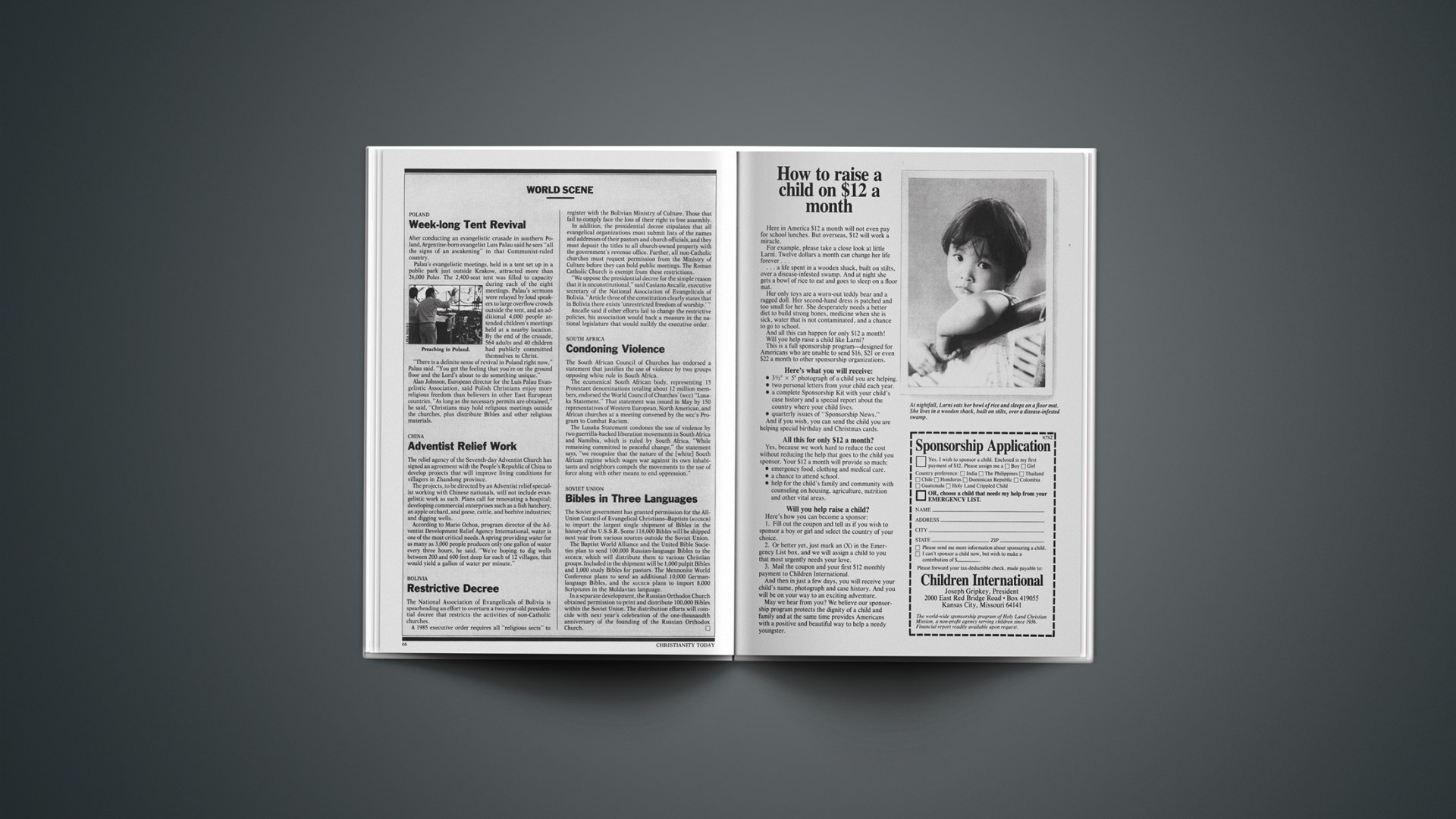POLAND
Week-Long Tent Revival
After conducting an evangelistic crusade in southern Poland, Argentine-born evangelist Luis Palau said he sees “all the signs of an awakening” in that Communist-ruled country.
Palau’s evangelistic meetings, held in a tent set up in a public park just outside Krakow, attracted more than 26,000 Poles. The 2,400-seat tent was filled to capacity during each of the eight meetings. Palau’s sermons were relayed by loud speakers to large overflow crowds outside the tent, and an additional 4,000 people attended children’s meetings held at a nearby location. By the end of the crusade, 564 adults and 40 children had publicly committed themselves to Christ. “There is a definite sense of revival in Poland right now,” Palau said. “You get the feeling that you’re on the ground floor and the Lord’s about to do something unique.”
Alan Johnson, European director for the Luis Palau Evangelistic Association, said Polish Christians enjoy more religious freedom than believers in other East European countries. “As long as the necessary permits are obtained,” he said, “Christians may hold religious meetings outside the churches, plus distribute Bibles and other religious materials.
CHINA
Adventist Relief Work
The relief agency of the Seventh-day Adventist Church has signed an agreement with the People’s Republic of China to develop projects that will improve living conditions for villagers in Zhandong province.
The projects, to be directed by an Adventist relief specialist working with Chinese nationals, will not include evangelistic work as such. Plans call for renovating a hospital; developing commercial enterprises such as a fish hatchery, an apple orchard, and geese, cattle, and beehive industries; and digging wells.
According to Mario Ochoa, program director of the Adventist Development Relief Agency International, water is one of the most critical needs. A spring providing water for as many as 3,000 people produces only one gallon of water every three hours, he said. “We’re hoping to dig wells between 200 and 600 feet deep for each of 12 villages, that would yield a gallon of water per minute.”
BOLIVIA
Restrictive Decree
The National Association of Evangelicals of Bolivia is spearheading an effort to overturn a two-year-old presidential decree that restricts the activities of non-Catholic churches.
A 1985 executive order requires all “religious sects” to register with the Bolivian Ministry of Culture. Those that fail to comply face the loss of their right to free assembly.
In addition, the presidential decree stipulates that all evangelical organizations must submit lists of the names and addresses of their pastors and church officials, and they must deposit the titles to all church-owned property with the government’s revenue office. Further, all non-Catholic churches must request permission from the Ministry of Culture before they can hold public meetings. The Roman Catholic Church is exempt from these restrictions.
“We oppose the presidential decree for the simple reason that it is unconstitutional,” said Casiano Ancalle, executive secretary of the National Association of Evangelicals of Bolivia. “Article three of the constitution clearly states that in Bolivia there exists ‘unrestricted freedom of worship.’ ”
Ancalle said if other efforts fail to change the restrictive policies, his association would back a measure in the national legislature that would nullify the executive order.
SOUTH AFRICA
Condoning Violence
The South African Council of Churches has endorsed a statement that justifies the use of violence by two groups opposing white rule in South Africa.
The ecumenical South African body, representing 15 Protestant denominations totaling about 12 million members, endorsed the World Council of Churches’ (WCC) “Lusaka Statement.” That statement was issued in May by 150 representatives of Western European, North American, and African churches at a meeting convened by the WCC’s Program to Combat Racism.
The Lusaka Statement condones the use of violence by two guerrilla-backed liberation movements in South Africa and Namibia, which is ruled by South Africa. “While remaining committed to peaceful change,” the statement says, “we recognize that the nature of the [white] South African regime which wages war against its own inhabitants and neighbors compels the movements to the use of force along with other means to end oppression.”
SOVIET UNION
Bibles In Three Languages
The Soviet government has granted permission for the All-Union Council of Evangelical Christians-Baptists (AUCECB) to import the largest single shipment of Bibles in the history of the U.S.S.R. Some 118,000 Bibles will be shipped next year from various sources outside the Soviet Union.
The Baptist World Alliance and the United Bible Societies plan to send 100,000 Russian-language Bibles to the AUCECB, which will distribute them to various Christian groups. Included in the shipment will be 1,000 pulpit Bibles and 1,000 study Bibles for pastors. The Mennonite World Conference plans to send an additional 10,000 German-language Bibles, and the AUCECB plans to import 8,000 Scriptures in the Moldavian language.
In a separate development, the Russian Orthodox Church obtained permission to print and distribute 100,000 Bibles within the Soviet Union. The distribution efforts will coincide with next year’s celebration of the one-thousandth anniversary of the founding of the Russian Orthodox Church.










